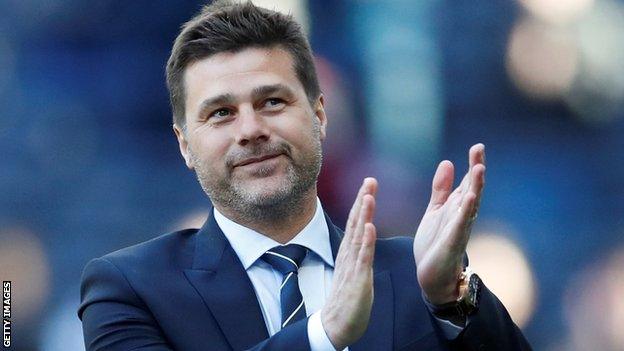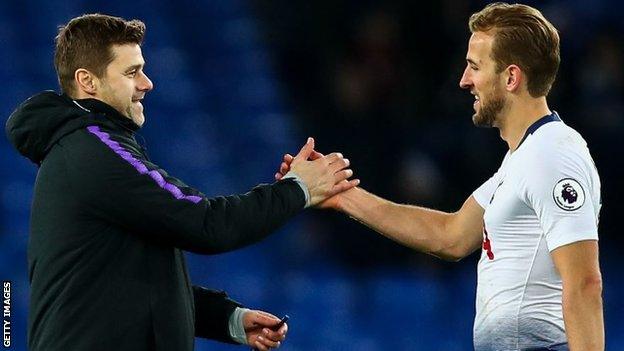Mauricio Pochettino: What next for Tottenham boss?
- Published

Guillem Balague is the host of BBC Radio 5 live's Football Daily podcast on Thursdays covering European football. Here he gives his view on Tottenham boss Mauricio Pochettino.
Less than a month ago, Mauricio Pochettino was widely regarded as the leading contender for two of the most prestigious jobs in world football. Real Madrid and Manchester United were both being led by stop-gap managers, and the Argentine seemed set to be at the centre of a summer battle for his services.
Football moves quickly, though. Real and United both considered him, but needed to react to their changing circumstances quickly. Longer-term planning was shunned in favour of appointments - of Zinedine Zidane and Ole Gunnar Solskjaer - that just felt right at those precise moments. Time will tell if those were good decisions rooted in logic or sentimental appointments lacking in longer-term vision.
Either way, the events of the past few weeks have left Tottenham's manager at a crossroads.
Unfortunately for Pochettino - with whom I spent a lot of time last year while writing a book about his managerial style, work at Spurs and life story - his team have suddenly forgotten how to win Premier League games.
Yes, they impressed against Borussia Dortmund in the Champions League, but they have taken only one point from 15 domestically - the worst run of the manager's five-year reign.
All of which begs the question: what next for Pochettino? And is there an argument that this ambitious man has taken the club as far as he can?

Tottenham have finished fifth, third, second and third in Mauricio Pochettino's four full seasons in charge
The recent slump certainly suggests that the progression of a young side is at risk of stalling, in numerical terms at least.
With 61 points so far this season, Tottenham have picked up three points fewer than after 31 matches a year ago. It is seven points lower than it was two seasons ago at the same stage.
Compared with this point of last season, they have won one more game (20). But, more tellingly, they have lost 10, twice as many as the five defeats they suffered back then and as many as in the entire 2015-16 and 2016-17 seasons.
There are mitigating factors, of course, not least the lack of a real 'home' stadium for the past two seasons, the absence of a single signing since January 2018 and the mid-season loss of the influential midfielder Mousa Dembele.
It is hard to argue against the view that the players have maximised their potential but every time a new corner is turned the same question has been put forward: how much more can Pochettino get from this team?
As targets are met, players inevitably start feeling comfortable and perhaps even feel they are better than they truly are. These are all very human reactions. But mixed results and poor performances have even led the players' attitude to be questioned by the manager himself.
Has the team peaked? It feels that way.
Pochettino's boss, chairman Daniel Levy, has overseen the move to the new Tottenham Hotspur Stadium, a landmark moment in the club's history, with the first team's first match there against Crystal Palace on Wednesday. While that - and the difficulties of the transfer market - have kept him busy over the past few years, he has been able to watch the team safe in the knowledge that they have been progressing consistently.
What he is faced with now is a side almost five years older than when the Pochettino project began and one that is probably about as good as it is going to get. If money had been available, two or three clever signings would have allowed the progression to continue, but now logic says that things are going to stall.
Pochettino continues to try to find solutions by adding different tactical layers, but the lack of new faces to freshen up the approach has been a problem.
Of all the top sides in the Premier League, Tottenham stand out as the one without a clear starting XI, where rotation rules the roost. That tells you the story. While every other team has identified 10-11 starters that are superior to the rest, at Spurs there is really only one irreplaceable player, Harry Kane.

Harry Kane (right) has scored 24 goals in all competitions for Tottenham this season
The club's inert transfer policy has led to the same names being around for a long time and that has brought a closeness and cohesion to the squad.
But football teams are like families; familiarity can breed contempt. It also breeds the certainty that there isn't anyone about to be brought in to kick your feet away from under the table.
The result of this has been the losing of matches that should have been won. Away defeats at Watford, Southampton and Burnley and a home loss against Wolves are indicative of a side that is not as good as it would like to think it is.
Most worryingly it has allowed the other teams to steal a march on them. Spurs probably deserved at least a point from Sunday's visit to Anfield at the weekend, but there is a huge and growing gap between them and Liverpool and Manchester City. Meanwhile the teams chasing them - Manchester United, Arsenal and Chelsea - are in close proximity. That says it all.
In restricted circumstances, Pochettino's job has consisted of lots of work on recuperation and on maintaining the necessary physical levels for his brand of football, and avoiding conflict. It has been about adapting and integrating.
In the past, players were challenged and pushed, but what has been important recently is to keep harmony - better to take a couple of steps back than create situations that provoke problems which are difficult to solve because of a lack of alternatives.
On the plus side, there is genuine excitement and anticipation surrounding the new stadium, which can only help Spurs as they enter the home straight in the Premier League and Champions League. Finally we can write about Spurs home fixtures without having to place the word 'home' in quotation marks.
Boosted by their impressive residence, Tottenham and Pochettino are geared to achieving the best possible finale to Spurs' season. The small matter of Manchester City stands between them and an almost unthinkable place in this year's Champions League semi-finals.
But then what?
With Real Madrid and Manchester United now out of the equation, the talk is that Juventus, Inter and Bayern Munich have studied the possibility of luring Pochettino away from Spurs.
If any one of the three feel that is the way ahead, they would need to find something in the region of £30m-£40m to stand any chance of prising him away from Levy. That would constitute a big risk and big money that most clubs would probably rather be spent on players than coaches.
Any recent movement of elite managers to top clubs has been conducted on a basis where no money has changed hands (and where the coaches involved have been available).
Should either the club, or Pochettino himself, decide that the timing is right to call a halt to his tenure at Spurs, one likely option would be a clean break to allow him to recharge the batteries before seeking his fortunes elsewhere.
'Possibly the best in the world' - Spurs fans on new stadium
Football shows us that one should never say never, and also that there is no point in worrying about things that are not in your hands. Maybe one of these three sides might decide to throw all their eggs into a Pochettino basket. The most likely scenario, however, is that he will stay at Spurs and enjoy their new home.
As for what's left of this season, it may yet end in Madrid for Pochettino, though not as we might have expected last month. The Champions League final takes place at Atletico's Wanda Metropolitano stadium on 1 June and, while it seems unlikely, it is not unthinkable to imagine the Argentine leading Spurs out for that fixture.
It would be an extraordinary end to a campaign that has probably been the most demanding of Pochettino's career. In fact, he now finds himself facing possibly the most important six weeks of his footballing life; six weeks that could well define both his and Tottenham's long-term future.
Huge capacity & its own microbrewery - Spurs' £1bn stadium in numbers